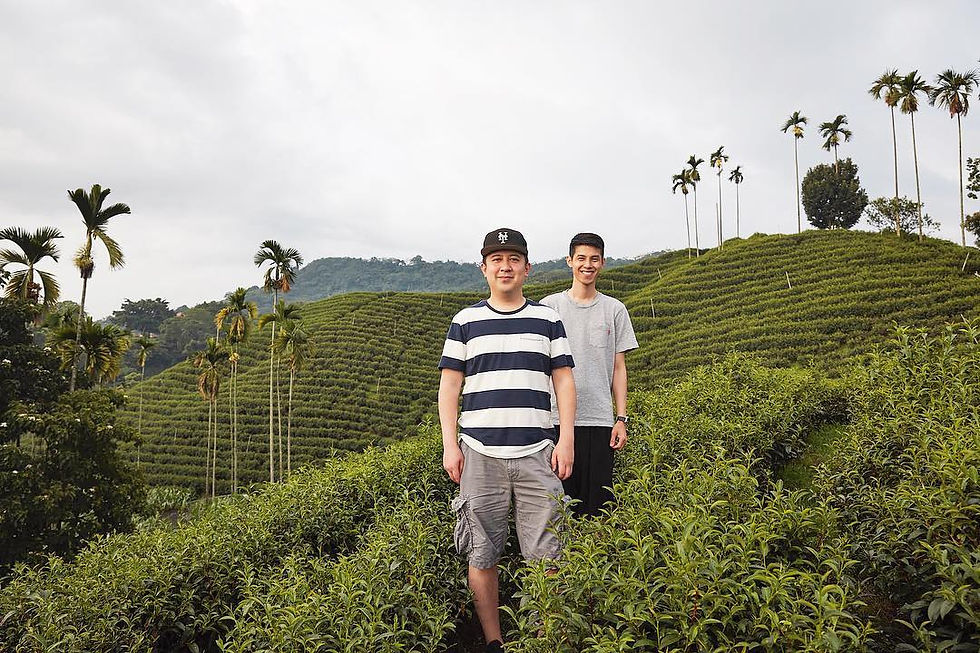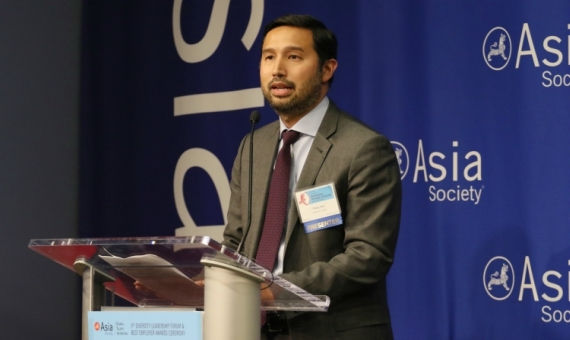Episode 50 | Boba Guys (Part 1): Bin Chen and Andrew Chau
- Chia-Yi Hou

- May 4, 2020
- 6 min read
We really started Boba guys as almost like a personal hobby experiment. There wasn't at the time, a true agenda.
Below is an abridged audio transcript of Episode 50 from Season 4 of Rock The Boat: Making Waves, edited for clarity.

If you are a bubble tea fan, you have heard of Boba Guys. They are a West Coast based boba shop that started out as a side project between two friends who had lives in the corporate world. Boba Guys serve quality drinks with an Asian American flair with flavors like horchata, Indian chai, and Duke of Earl Gray, in addition to traditional milk tea flavors like a Hong Kong milk tea, Jasmine, et cetera.
In this two episode interview on the podcast, Lucia talks to Bin Chen and Andrew Chau about starting Boba Guys, quitting their jobs, and what difficulties they have been facing during the COVID-19 pandemic. The coronavirus has put a lot of small businesses like the Boba Guys in tough situations, closing up stores and laying off employees.
In Part 1:
Origins of Boba Guys
The meandering professional careers of both Bin and Andrew before quitting to go all in on Boba Guys
Their thoughts on creating a culture company that builds bridges
The following is an abridged transcript of the episode. To listen to the full episode, find us on Anchor, iTunes, Spotify, or wherever you listen to podcasts!
I. Boba/bubble tea
Lucia: I'm super curious from both of you actually, like, when was the first time you've tried bubble tea?
Bin: for me, it was when I was going to Chinese school as a kid. so I, I grew up in Wharton, Texas, which is a really, really small. A Texas town, and we didn't really have a Chinatown or anything close to that, or even Chinese people. and so on Sundays my parents would take me to Chinese school and as a treat, if I did well there, they would, take me to the Boba shop.
Andrew: I think it was similar. I think Bin and I have talked about, seemed like we had parallel paths. I think it was originally when my mom said, "Hey, Andrew, let's go to a place, in the Bay Area." My mom had read about it in one of those Asian newspapers.
Lucia: Do you guys, know the actual meaning of Boba? Like, the word Boba.
Andrew: So I didn't have my time when he's, mom did not tell me any of that. It was until we, I mean, she would call it, you know, Oh, let's grab, you know, I think she said zhen zhu nai cha. She didn't actually say it in English. So I don't even know when I first used the word Boba until high school, maybe high school, and I was, because my, like non-Asian friends would say that, but when we were naming Boba Guys, I only found out what the real meaning was.
Until we named Boba guys in 2011, when we did a pop up and I told my mom what the name was, and she goes, "Andrew, why are you calling yourself boob guys or breast guys?"
And I was like, huh. And I go to Bin and I say, "Hey, Bin, my mom says it means breast and boobs." I think I looked it up too. I go, "Did you know it the whole time?"
And he's like, yeah. Sounds like I'm like the only one out of the loop. and so that is actually how, so I had a long gap between me knowing the word all the way until starting Boba guys in, which I had, I was so oblivious.

II. Beginnings of Boba Guys
Lucia: What did your parents think as you guys were doing this on the side?
Bin: I think, my parents were, were really supportive of it. I think I had an easier pass cause you know, I've, I went into advertising and creative and that was already kind of out of left field. and so they, my parents, had been used to it all my life.
Andrew: I think maybe one of the themes from my side of the story is like I'm really good at disappointing my parents. My whole life is like, them saying, you have so much potential if you only did this.
I think a lot of my life has been that way cause I'm a little bit on the rebellious side.
When I was in college. I went to a good undergrad and I actually got into school thinking I was going to be a doctor. You know, I was, you know, my parents were pretty lower middle income, so they didn't really have, I had to get either scholarships, but I really couldn't go to private schools, so I actually, I went to Cal.
While I was in undergrad, and I actually, even though I, people see me as the kind of like me as a business student, I was really, for those who knew me, then I was actually really, drawn to sociology. And if you kind of read my writing and my background, my specialty is actually social psychology.
Lucia: There was a certain point where either of you were thinking about quitting. Was that like when you were still working or was that after you guys, both quit your jobs to do this full time? And what was that scenario like?
Bin: Yeah, that was, that was after we'd ran the popup. And so we'd run the popup for a couple of months. We wrote, you know, weekly articles on good magazine that kind of detailed the adventures of doing a food startup. And we kind of built a following, kind of an underground following, on Facebook and Instagram.

But when you do a pop up, I don't know if they tell you this, but you don't really make that much money, you know? And so we looked at it more as a proof of concept. We were caught in between these two worlds. We were like 28, 29. Do we want to kind of like go full throttle on our corporate careers, cause we both had a pretty successful run as just corporate people.
Had we stuck with it, now we'd maybe be like, directors, VPs or whatever.
What we did was we shut the popup down over the winter that kind of think about it. and see if we wanted to go down that route or not. And then, you know, after winter break came back, we both agreed that we were going to go jump both feet in and really build that first store even while keeping our day jobs just to see it through.
III. #BobaLife
Andrew: We really started Boba Guys as almost like a personal hobby experiment. There wasn't at the time, a true agenda. I think Bin and I openly say to tell people we didn't quit our full time jobs until three, four years in.
So that tells you, we didn't really know what we were doing because we were just thinking this might fail this, this does not gonna really go anywhere.
At the same time, we were intentional in that if there was one part of the personal hobby that we intentionally did was, "Hey, how do we just make Asian culture and more accessible and with less stigma."
And it's weird because we're literally, as we do this podcast, we're in the middle of the COVID-19 coronavirus crisis, and it's all coming back where there's this same stigma.
To this day, Asians just have a hard time communicating our culture to the masses, which is why there's racism and there's so many obstacles that we have, whether it's in coronavirus time or in media and representation in politics.
We just have trouble communicating.
That being said, both Bin's advertising background, his communications background, and my sociology background, he and I would spend hours at lunch sometimes too long, cause we're still at Timbuktu. We were talking about social theory. And so we had a rough idea on how to make Asian culture accessible.
So we're introducing real culture, but the way we do it is not hitting people over the head with it. We're not just an ethnic, you know, culture company. There's a difference between what we do, so much sustainability stuff. People will say, we're actually very California versus New York.
Lucia: You are, you are. Yes.

Andrew: But how do we work so well in New York? And that's the same type of bridging culture. So it has nothing to do with this ethnicity.
What Boba guys did, this is kind of our secret sauce. We kind of figured out a way to really connect with the community and find people who are like-minded, like yourself, who want a world in which it looks a lot more like the Fast and Furious cast, where everyone gets along. It's diverse and everybody has their own role, but you recognize each person's identity versus this us versus them, which to be honest, I said to you in one of the other conversations, I think the Asian community needs to do better.
We make it about us versus them, and we wonder why we have no allies, right? Or we have very few allies. And Boba Guys, over the nine years, we have allies all over.
Show Notes
This was the first part of the interview with the Boba Guys. Part two will follow, where Bin and Andrew talk about closing shops during the COVID-19 pandemic.
In the meantime, you can follow Boba Guys:
This was a short version of the episode. Listen to the full episode on Anchor, iTunes, Spotify, or wherever you listen to podcasts!




Comments